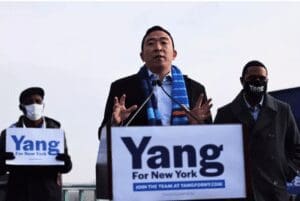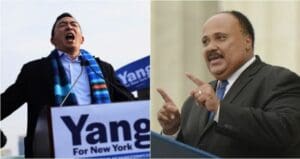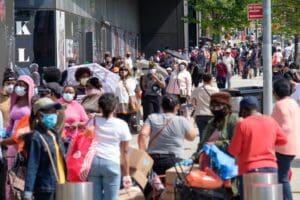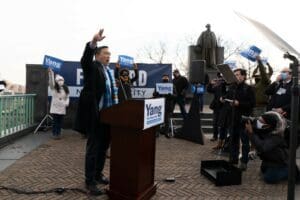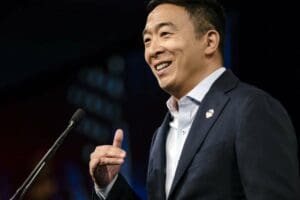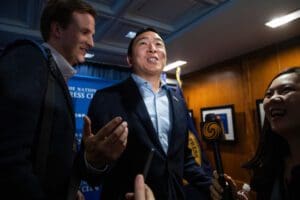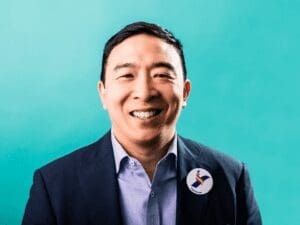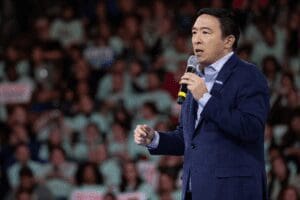Andrew Yang takes no pleasure in looking prophetical.
The tech entrepreneur and former candidate for president, who last month suspended his campaign after poor showings in Iowa and New Hampshire, built his candidacy around the idea of universal basic income — that Americans should receive $1,000 each month from the government. The proposal was not so much panned as it was ignored, with many in the political class refusing to entertain such a radical notion during the Democratic presidential primary. All the while, Yang built a cult following with his case that a “Freedom Dividend,” as he called it, was the only way to protect millions of individuals, as well as the broader economy, from fiscal ruin in the face of spiraling unemployment due to advances in automated technology.
That particular day of reckoning has yet to arrive. But an equally dire set of circumstances — playing out in a more compressed time frame — is set to vindicate Yang’s argument for putting cash straight into the pockets of millions of Americans.
In response to the economic threat posed by the spread of , the highly contagious coronavirus that has emptied out hundreds of thousands of schools and businesses virtually overnight, the Trump administration on Tuesday announced its intention to mail checks to Americans as quickly as possible. Consensus has formed at warp speed that this is the most effective way to help suddenly cash-strapped people pay their bills and keep the economy afloat. The specifics remain unclear, but Treasury Secretary Steven Mnuchin said he was conferring with members of Congress, and that the amount of money could exceed the $1,000 being floated on Capitol Hill.
All of which put Yang at the center of attention. “My phone is blowing up,” he tweeted shortly after the White House briefing, an observation that had won 56,000 likes as of Tuesday evening and counting. For all the congratulatory notes, however, Yang is deeply unsettled about the crisis, no matter the role it might play in advancing his signature issue. “This whole thing is so fucked up,” he said.
I spoke with Yang on Tuesday afternoon about the administration’s response to COVID-19, his sudden reemergence into the spotlight, and why he now expects a debate about universal basic income this November. Our conversation has been edited for length and clarity.
TIM ALBERTA: First things first: Are you at home with your family?
ANDREW YANG: Yeah, we’re in upstate New York, happily so. We’re just chillin’.
ALBERTA: And everyone’s healthy?
YANG: Yup. Everyone’s good. You know, I’ve been taking a car twice a day into the city and then back out here. It’s been weird. It’s just gotten quieter and quieter every day in the city.
ALBERTA: At some point, are you just going to pack it up and stay upstate?
YANG: That’s pretty much what I’m trying to do now — except for the fact that, you know, CNN wants me in studio periodically. But yeah, I’m essentially camped out here. Evelyn bought a ton of provisions. My mom is self-quarantining in the city right now. And it’s funny because, like, I could have the coronavirus right now and we wouldn’t know. So, do I bring my mom up here? I’m scratching my head, is that wise to invite her here? I don’t know. I’m like, ‘Mom, come here!’ And then I infect her. So, I don’t know.
ALBERTA: Do you happen to know anybody who has contracted the virus?
YANG: No, I can’t say I do.
ALBERTA: Well, that’s good.
YANG: Not that we know of, anyway. There are a couple of people that had the flu but they never got tested. So, who the hell really knows?
ALBERTA: You know, after we spent the day together on Iowa caucus day, I flew home to Michigan and got really sick, sicker than I’ve ever been in my life, and wound up hospitalized with the flu. I was coughing up blood. Turns out I had a respiratory infection. But the doctors didn’t even discuss testing me for it. There was no mention of it, like the virus didn’t exist—and that was last month!
YANG: That’s what freaks me out about the whole thing. What we’re doing is saying things like, “Keep your social distance,” and trying to stop the spread that way, which is fine. But we have shit for data. Like, we don’t know what the infection rate is. And so, there’s no reason we would ever be able to give the ‘all-clear.’ If you don’t have any data, this whole thing is a nightmare that doesn’t end. When you close schools, what gives you the all-clear to say, “OK, open them again”? Nothing. There’s no data to compare it to. This whole thing is a fear-based approach with no end in sight. There’s no catalyst to ever sound the all-clear. This whole thing is so fucked up.
ALBERTA: You tweeted earlier today, “My phone is blowing up.” And obviously that came after the press conference at the White House where the administration announced its intention to put cash straight into the pockets of Americans to combat an economic meltdown. First off, who was blowing up your phone? And what were they saying?
YANG: I got dozens of text messages from friends, family, colleagues, supporters saying, “You did it.” I mean, that was the tone of most of them. One person said that they were crying tears of joy that they felt like we helped bring the solution to public attention just in time to be implemented. And obviously, no one would ever want it to be under these circumstances. But it does feel very much like we championed a new and different approach to improve Americans’ lives right as the coronavirus started to shut down the economy.
ALBERTA: Before we turn serious—there’s that game, who’s the most famous person in your cellphone? This is a variation of that: Who’s the most famous person that texted you today?
YANG: Hmmm. Probably Dave Chappelle.
ALBERTA: As you said, it’s, it’s got to feel a little, a little strange, right? Because you don’t want to be called a prophet during a time like this. But the circumstances you were describing during the campaign were not altogether different from what we’re seeing right now—millions of Americans losing their work and losing their ability to pay bills, and the whole economy as a result of that going into a downward spiral.
YANG: A lot of what I talked about was the rate of change. I was painting a picture where we wind up automating millions of American livelihoods and then are left trying to figure out what the path forward is for those people, their families, those communities. What the pandemic has done is accelerate those circumstances in an incredibly compressed time frame where it has literally sent tens of millions of Americans home all at once. I was talking about an evolving automated economy that would affect more and more of us home over time. And it’s become painfully obvious that putting money into our hands is the only commonsense solution to keep our families afloat.
ALBERTA: Let’s step back for a second. Zach Graumann, your campaign manager, tweeted a little while ago during that White House press briefing, “PLOT TWIST: Donald Trump wins re-election on Andrew Yang’s policy platform.” And then he had an exploding head emoji. Does it feel like your head is exploding right now?
YANG: Well, certainly I never imagined that I would suspend my campaign in February and then we would agree to pay $1,000 a month to Americans in March. (Laughs hysterically.) That was not something I could have imagined. But here we are. This pandemic is jeopardizing the material wealth of tens of millions of Americans. They can’t leave home to work and put food on the table because their kids can’t go to school. Most Americans have very little in the way of savings. There’s this fanciful notion that people can afford to stay home from work for weeks on end. But most Americans can’t. So, you can imagine families where their savings are depleted, their access to credit is limited, it’s possible even that some of the places that they would go to get food or supplies may not be functioning at capacity. Things get very dark and very bleak very quickly. And if you’re looking from a national scope as to how to improve things, putting money into their hands resolves some of the worst concerns very, very quickly. It’s a commonsense solution. Actually, it’s the only solution.
ALBERTA: There are people online right now responding to your tweet—and, by the way, you are most definitely trending today—they are calling on you to unsuspend your campaign and continue running for the presidency given this chain of events.
YANG: I certainly appreciate the sentiment and the thought did occur to me. But you know, the reason I suspended was that I didn’t see a numerical path to victory. And that’s even more true today, given the state of the race—we don’t even know when these other states are going to vote! So, the math has not changed on that side. But I’m excited about my new organization, Humanity Forward, and the fact that we’re still having a massive impact on the solutions that our country is looking at implementing in this time of need. I was concerned, after suspending the campaign, that the energy around this idea would diminish after the campaign. But if anything, it’s grown. And I think that growth is going to continue—unfortunately, driven by these circumstances.
ALBERTA: I want to be clear about this: People should not conflate what you proposed during the campaign, giving Americans over 18 years old $1,000 a month, with what the administration talked about today, which was a one-time cash infusion. Are you concerned that what Washington is considering won’t be enough?
YANG: If we do put cash in peoples’ hands, people will recognize that it has an immediate good. Every American who gets the money will say, “Oh, my gosh. I needed this badly. This really takes a load off. Now I’m not going to stock up on some food or pay this bill that’s been haunting me.” There are, of course, massive problems ahead, which to me is the reason why we need to make this money regular. If they send it out around, let’s say the end of March, and then this crisis drags into June, then clearly whatever money we sent in March will have been exhausted. It’s one reason why we need to make this regular and predictable and say, look, as long as the economy is locked down, then you’re going to get this every month. Those cash payments would be vital for tens of millions of Americans and everyone will know it and feel it. Now, are there other things that we need to do to ensure that we are able to both weather this crisis and get back on our feet? Yeah. There are a lot of things. And I’ve never been one to confuse money with the real economy, in the sense that if I have money in my hands but my grocery store is not open, then it’s not as useful. We need to make sure that the grocery stores are open and stocked and their infrastructure needs are met so the economy can function in the right way.
ALBERTA: One thing that we’re not discussing is the raw politics of this. You ran for president, so obviously you’ve got a window into this. Handing out billions of dollars directly to Americans, in an election year, is going to be unprecedented — maybe the biggest stroke of populist economic policy this country has ever seen. Don’t you think this gives the incumbent president an advantage, no matter how clumsy his initial response was? If bailing out the auto companies and autoworkers was politically beneficial in Michigan, then isn’t bailing out all Americans, and the businesses they run and the communities they’re part of, a political windfall for the president?
YANG: I’m not one to lead with politics. And one could easily argue that many Americans feel like we’re in worse shape because of our response to the virus initially, so to me, the important thing is to try and help keep people strong and healthy and whole. I don’t think anyone likes the way Donald Trump has talked about the coronavirus, you know what I mean? Like, the idea that somehow this is a political plus for him, it’s clearly not. Right now, we’re in a crisis and he needs to help the American people.
ALBERTA: Fair enough. So, if you were president right now, is there any one immediate action that you would take that the president has not yet taken?
YANG: I think the nature of that guidance has to be different, personally. I think they need to be transparent about what kind of data we’re relying on, to give people a sense of the timeline. Right now, our sense of the future is so cloudy. And you get the sense the president went from not taking this seriously to suddenly realizing its seriousness, and now we’re reacting in various ways to slow the spread of the virus. But then what? I would be clearer as to what the timeline looks like, what data we’re going to rely upon, how we’re going to get that data, what steps we’re taking to increase testing capacity and just give people a sense of the future.
We need to know now what the future can look like under different scenarios and then be presented with what scenario we’re in when that time comes. We’ve been on lockdown for half a week. Right now, the American people don’t have any visibility into whether it’s going to be four more weeks or four more months, and we don’t know how those judgments are going to determined. As president, I would say, “Look, here’s the information, here’s the dashboard, here’s what we’re lining up, here’s what we’re hoping for, here’s how circumstances could change, and thank you for doing your part—if you proceed with like the rest of the country in flattening the curve and keeping things under this level, then we can look forward to this.” You know, so we could actually have a sense of accomplishment and purpose.
ALBERTA: Here’s what I’m wondering. It’s purely hypothetical. Let’s stipulate that you continued campaigning and won the presidency in 2020, and that instead of COVID-19, it comes later on. In 2023, the world gets hit with COVID-23. So, three years into your presidency, along comes this pandemic and millions of people are suddenly having to stay home from work and school and businesses are shutting down. Everything is a mess. But, Americans have been receiving $1,000 a month in universal basic income for the past three years. If that were the case, do you think that we would still need some sort of massive cash infusion, the likes of which is being proposed today? Or do you think that UBI would be sufficient in preventing the sort of systemic economic collapse we’re facing right now?
YANG: Well, you would have a different mix, a different recipe. So, let’s say that every American has been getting a thousand bucks a month for the past three years and you’re going to get them more now, then the capacity for Americans to go home, stay in, forgo their shifts and still be able to feed themselves will be much, much stronger and higher. Now, if you did decide that you wanted to put cash in their hand, it would be less of an existential situation and more of a situation where we’re trying to help, trying to make up for some of the losses, but we’re not worried as much about your very survival because your survival is more or less ensured going in.
ALBERTA: Is there any part of you, while watching this present situation unfold, that thinks maybe a thousand bucks a month isn’t enough? Could you see yourself revising that number upward based on how this entire situation evolves?
YANG: One idea that’s been suggested, which I agree with, is giving a thousand bucks per adult per month and $500 per child per month, which is a bit of an adjustment from what I’ve been suggesting. And I think that given the cost for most Americans in terms staying home, I think that’s reasonable. If it turns out this administration goes higher than $1,000 a month, I’d be pleased; if they go higher, but it’s a one-time thing, I’m not as pleased. I think $1,000 a month over two months is a much better move than $2,000 up front.
ALBERTA: When you and I last spoke, right before the Iowa caucuses, we discussed how ideas like “Medicare for All” can move quickly from the fringe to the mainstream. And it seems like UBI could be on an even faster track. I mean, we talked about UBI becoming part of the discussion by 2028, maybe even 2024—not this November. Do you think we might have a real conversation about UBI as soon as this fall and that perhaps Joe Biden or maybe even Donald Trump might work into their general election platforms?
YANG: Yeah, I really do. I think that the fact is after Americans get this money in our hands of, they’re going to like it. (Belly laughter.) They’re going to say, “Wow, you know, this is pretty great. I’m less stressed out. I can feed my family. It doesn’t, all of a sudden turn me into some sort of lazy wastrel. (More belly laughter.) It doesn’t turn my neighbors into anyone different than they were yesterday. It’s just excellent. It makes my life better.” And then you’re going to have millions of Americans experience that and say, “Hey, that actually is something we could use all the time.” So, again, nobody would wish for these circumstances to prove it, but once people have the money in their hands, that’s going to be a very, very powerful experience that is going to gain support as time goes on. You’re 100 percent right—universal basic income is going to be a big issue in 2020, and again in 2024 if it’s not passed before then. I think it might be. I think we’re going to see its adoption very, very soon.
ALBERTA: So, what did Dave Chappelle say when he texted you?
YANG: “Man! You were right!”













